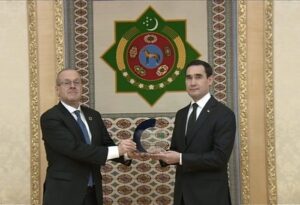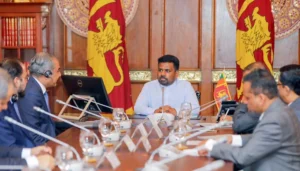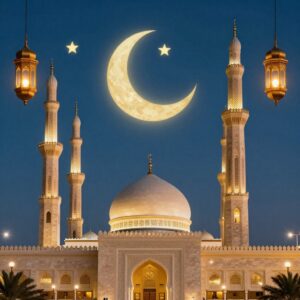Turkmenistan and Pakistan: A Strong Brotherhood of Peace, Culture, and Progress

Turkmenistan’s long-standing policy of neutrality, combined with its beauty, rich culture, and visionary leadership, stands as a beacon of peace and stability in a turbulent world. Turkmenistan’s contributions to fostering international cooperation and its unique position as a neutral state have made it a reliable partner and an essential player in regional and global diplomacy.
As Pakistan’s President Asif Ali Zardari embarks on his visit to Turkmenistan to attend the International Forum titled “Interrelation of Times and Civilizations – Basis of Peace and Development”, we witness a historic moment that emphasizes the deep ties between the two brotherly nations. The forum, hosted in the magnificent capital Ashgabat, celebrates the 300th birth anniversary of the great Turkmen thinker, poet, and philosopher, Magtymguly Faragi. This occasion serves as an important milestone, not only in Turkmenistan’s cultural history but also as an opportunity to reaffirm the enduring relationship between Pakistan and Turkmenistan.
Since gaining independence in 1991, Turkmenistan has steadfastly pursued a foreign policy of permanent neutrality, a status that was formally recognized by the United Nations General Assembly in 1995. This unique position has allowed Turkmenistan to act as a mediator in international disputes and avoid involvement in regional conflicts. It has also enabled the country to promote peace, stability, and development both within the region and beyond.
Turkmenistan’s neutrality is not just a policy but a fundamental part of its national identity. This principle of neutrality is reflected in the International Forum’s theme, “Interrelation of Times and Civilizations – Basis of Peace and Development,” which highlights the importance of learning from the past to create a peaceful and prosperous future. The forum underscores Turkmenistan’s role as a bridge between civilizations, connecting cultures and fostering dialogue for the common good.
The International Forum in Ashgabat is not just a celebration of Magtymguly Faragi’s legacy but also a platform for promoting peace and development on a global scale. Leaders, scholars, and experts from around the world will gather to discuss how the ideas and values of the past can inform present-day efforts to achieve peace, unity, and sustainable development.
President Zardari’s participation in the forum is a testament to Pakistan’s commitment to these shared goals. At the forum, President Zardari is expected to emphasize the importance of regional cooperation, peace, and unity. His address will highlight Pakistan’s close ties with Turkmenistan and the potential for further collaboration in areas such as trade, energy, and cultural exchange. Additionally, President Zardari’s bilateral meetings with Turkmenistan’s leadership on the sidelines of the forum will provide an opportunity to strengthen the bonds of friendship and explore new avenues for cooperation.
The relationship between Turkmenistan and Pakistan is rooted in a shared history, cultural affinity, and mutual respect. The two nations enjoy a strong and growing partnership, particularly in the fields of energy and infrastructure development. One of the most significant projects that symbolizes this partnership is the Turkmenistan-Afghanistan-Pakistan-India (TAPI) gas pipeline.
The TAPI pipeline, which has the potential to transform the region’s energy landscape, is a flagship project that exemplifies the vision of both countries for regional integration and economic development. By providing a reliable source of natural gas to energy-hungry markets in South Asia, TAPI holds the promise of not only meeting Pakistan’s energy needs but also enhancing regional connectivity and cooperation.
The successful implementation of TAPI will not only contribute to energy security in Pakistan but also help foster peace and stability in the region by creating economic interdependence among participating countries. Turkmenistan, with its vast reserves of natural gas, is playing a pivotal role in this project, and Pakistan is eager to see the pipeline become operational as soon as possible.
In addition to TAPI, there are other areas where Turkmenistan and Pakistan are working together to promote development and prosperity. Both countries are committed to expanding trade and investment, improving transportation links, and enhancing people-to-people contacts. The recent progress in infrastructure projects, such as road and rail links, will help facilitate the movement of goods and services, further deepening economic ties.
Beyond economic and political cooperation, Pakistan and Turkmenistan share deep cultural ties that date back centuries. Both countries have a rich heritage influenced by the ancient Silk Road, which served as a bridge between East and West, facilitating the exchange of ideas, goods, and culture. The shared Islamic values, along with a common history of trade and interaction, have created strong cultural bonds that continue to shape relations between the two nations.
Magtymguly Faragi, the great Turkmen poet and philosopher whose legacy is being celebrated at the forum, is a symbol of this shared cultural heritage. His works, which emphasize the values of unity, peace, and justice, resonate deeply with the people of Pakistan. The ideals he espoused are timeless and serve as a reminder of the importance of tolerance, understanding, and cooperation in today’s world.
Turkmenistan’s efforts to preserve and promote its cultural heritage are commendable, and Pakistan fully supports these endeavors. The celebration of Magtymguly Faragi’s 300th birth anniversary is not only a tribute to Turkmenistan’s cultural richness but also a reminder of the enduring power of art, literature, and philosophy to bring people together across borders and generations.
Under the leadership of President Serdar Berdimuhamedov, Turkmenistan has continued to advance its policy of neutrality while pursuing ambitious development goals. President Berdimuhamedov’s vision for Turkmenistan includes not only economic prosperity but also a strong commitment to international peace and cooperation. His leadership in hosting international forums like the one in Ashgabat demonstrates Turkmenistan’s role as a promoter of dialogue and understanding in the international arena.
President Zardari’s visit to Turkmenistan is one of the first major international engagements since he assumed office, and it highlights the importance Pakistan places on its relationship with Turkmenistan. The visit is an opportunity to reaffirm Pakistan’s support for Turkmenistan’s neutrality and its role as a pillar of stability in the region.
The International Forum in Ashgabat is a celebration of Turkmenistan’s rich cultural heritage and its commitment to peace and development. It also serves as a platform for strengthening the bonds of friendship between Pakistan and Turkmenistan.
As President Zardari participates in the forum and holds meetings with Turkmenistan’s leadership, there is great optimism about the future of this brotherly relationship. The two countries are poised to work together on projects like TAPI and other initiatives that will bring prosperity to the region. With shared values, cultural ties, and a common vision for peace and development, Pakistan and Turkmenistan are on a path toward even closer cooperation in the years to come.


